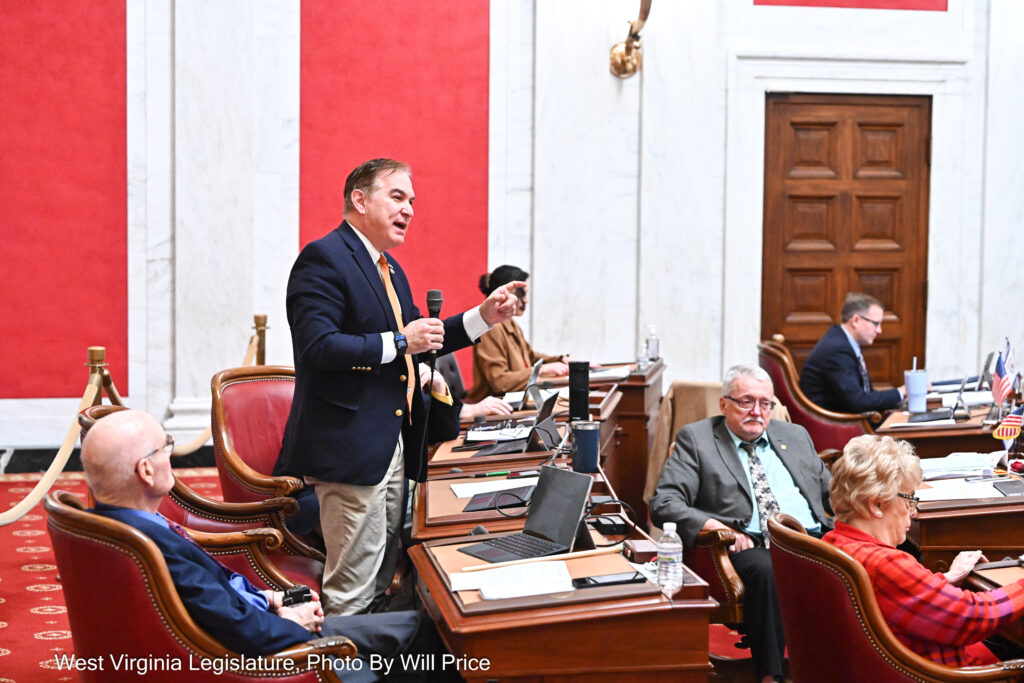The Senate passed 11 bills today and sent them to the House of Delegates for consideration. The Senate also advanced more than 20 other bills, seven of which are House bills. There was also emotional debate around a resolution.
Senate Resolution 42
Senate resolutions are a form of legislation on things like rules for the legislature, or to express sentiments. They can be a symbolic way of issuing support, which was the case for today’s Senate resolution.
Senate Resolution 42 supports Texas Governor Greg Abbott in using every tool and strategy, including razor wire fences, to secure the southern border.
The resolution also calls out President Joe Biden and chides him for a so-called refusal to secure the border.
Sen. Mike Stuart, R-Kanawha, is the lead sponsor of the resolution. He said he visited the border and saw the challenges the state of Texas is facing.
“As best we can tell, I’d say as best we can tell because we don’t know the numbers,” Stuart said. “At least eight million illegals have crossed across that border, who’s coming across that border.”
Stuart said that terrorists, human traffickers, child predators, and violent criminals are crossing the border everyday.
“We also know there are a lot of really good people coming across that border, looking for a better life. Texas governor Abbott is trying to provide some defense of that border, not only on behalf of Texas, but on behalf of all states, including West Virginia,” Stuart said.
Sen. Mike Caputo, D-Marion, was the only no vote on the resolution.
“That was a wonderful campaign speech,” Caputo said. “That’s what I think this resolution is all about. I want to begin by saying I certainly support a secure border.”
Stuart is running for Attorney General in the upcoming election. Caputo expressed concern for some of the measures supported in the resolution.
“We’re going to support utilizing every tool, including razor wire fences for innocent children that are being brought here by others?” Caputo said. “We’re going to support using razor wire fences. Have we lost our minds? Have we lost our minds? There’s no one of us in this chamber that doesn’t care about children. Razor wire fences!? It’s insane! I might be the only no vote up there. And I’m not ashamed of that. I’m not one bit ashamed of that. Because I’ll feel good about my vote. And I’ll feel good about my career here. I don’t feel good about the direction we’re going as president.”
Caputo is not running for re-election.
Senate Bill 375
A notable bill today was Senate Bill 375. The bill affects non insurance health plans known as Health Care Sharing Ministries (HCSM).
In HCSMs, members pay into a pool of money that is available upon approval if one of the members needs medical care. Members typically submit the bill for their health care to the organization, and if approved the care is paid for.
Organizations like this were prevalent among Amish and Mennonite communities for decades but have recently risen to mainstream popularity following the passage of the Affordable Care Act. Members of these organizations are exempt from the tax penalty originally required in the law.
They are not for profit organizations and are exempt from the regulations and oversight that insurance companies adhere to. That has raised concerns about consumer protection and solvency of the organizations.
Senate Bill 375 confirms the state insurance commissioner’s practice of not participating in the regulation of these programs.
The bill also requires the HCSMs to prepare an annual audit and to provide a written disclaimer notifying members, and potential members, that HCSMs are not an insurance policy and coverage of medical bills are totally voluntary and that members are ultimately personally responsible for the payment of their own medical bills.
Some public colleges and universities have a requirement that students have health care insurance. This bill states that HCSMs also would satisfy this requirement.
Michael Oliverio, R-Monongalia, said this bill will help students whose parents are uninsured.
“With the absence of this legislation, if those students’ parents are participating in a Health Share ministry program,” Oliverio said. “That will not count as insurance, as judged by the higher education institutions and in turn, those students or their parents would have to pay thousands of additional dollars during their college years to meet the health insurance requirement.”
Caputo was the only no vote on the bill as well. He said these programs are not cost effective.
“I’ve done some research on it, Caputo said. “I found that a lot of procedures aren’t even covered. A lot of things have to come out of pocket and be reimbursed and some people may not have the money to pull it out of pocket.”




















